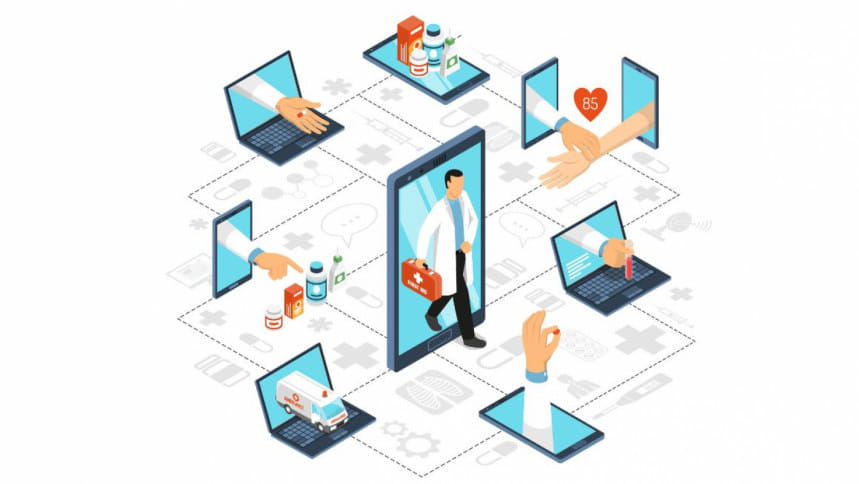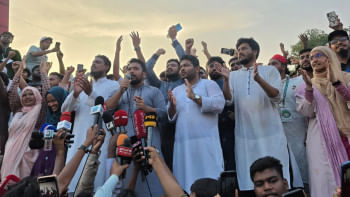Self-sufficiency in healthcare: The Florida case

Bangladesh can revolutionise health and social care by modelling after "Hope Florida." In 2021, Florida's First Lady Casey DeSantis launched the programme to promote self-sufficiency among the citizens. The innovative approach has integrated all social and economic services in the state into one platform, and has since been expanded multiple times. As someone who has led his agency to manage a project under this programme, I strongly suggest that Bangladesh build a similar infrastructure to not just advance healthcare, but also self-sufficiency.
Self-sufficiency starts with social care, which was once thought to be a distinct phenomenon outside of economic and health domains. However, as more data is available, the World Health Organization (WHO) has concluded that social services inherently enhance individual, population, and community health. Recent numerous studies have demonstrated that many health-related issues stem from the lack of adequate social and human services, and that we must treat social services as the precursors to self-sufficiency.
Income inequality is a stubborn issue that deeply hurts health and social care for low-earning individuals. As I have said before in a column published in this daily, the poor in Bangladesh are cornered against the massive wall of income and health inequity, even though the country continues to make progress in these areas. However, we need a smarter and bolder approach that will achieve results fast. To this end, Bangladesh can better align its resources to address health and wellbeing for all after the Hope Florida example.
First, we must break down silos between healthcare and social care and bring them under one umbrella. According to a recent report by the International Labour Organization (ILO), Bangladesh has 114 social protection programmes. These programmes operate mostly in isolation. I recommend that all of these services be integrated under one comprehensive framework. My team and I have learnt one surprising lesson while working on Hope Florida: there are more social programmes than we initially thought, and combining them under one aegis expedites services across socio-economic backgrounds as it streamlines disparate initiatives.
The approach benefits all citizens, especially those dependent on charities and government benefits by allowing them to age in place, i.e. without requiring them to travel to receive assistance. This is particularly beneficial for children, pregnant mothers, at-risk and justice-involved youths, low-income families, older adults, and the disabled – the populations that incur the most health and social services costs. By allowing them to get care at their places of residence, we can cut transportation costs and healthcare visits while increasing their comfort and wellbeing. We must introduce social programmes in every neighbourhood, especially in areas with the greatest need.
Secondly, we must adopt and innovate digital services to support infrastructure and initiatives. In Florida, all 75 self-sufficiency services are digitally accessible, allowing a wide range of online services. People can electronically submit their applications from home. Unfortunately, even though Bangladesh is pursuing a "Smart Bangladesh" goal by 2041 and has celebrated its accomplishment of the "Digital Bangladesh" mission in 2021, achieving internet sufficiency is still a far cry. It is imperative that the government commits substantial resources to implement the Smart Bangladesh vision, which will accelerate self-sufficiency.
Universally, a culture of social stigma and naming and shaming exists about receiving free or subsidised food or services. By digitising health and human services, we can help remove the sense of guilt in beneficiaries by transitioning them from "asking for help" to a "self-help" environment. When digitised, social services meet people at their places, rather than people meet services in their locations. This approach allows people to find and avail care for themselves in their neighbourhoods, empowering them to pursue self-sufficiency.
Digitisation of services will also promote the efficiency of operations in terms of transparency and gap analysis. Staff at the serving agencies can electronically review information, conduct screening, eligibility, referrals, etc – all without in-person encounters with the clients – saving space and costs, and reducing administrative overheads. Most importantly, it will allow data collection across the ecosystem, assess outcomes, and bridge gaps, facilitating a more scientific and transparent path towards achieving self-sufficiency.
Lastly, even though it seems banal, educating people on the importance of seeking help when needed is paramount. Domestic violence, loss of housing and transportation, food deprivation, etc cause stress and destroy families. Behavioural and mental health issues can threaten the safety of the patient and their caregivers. Political violence and unsafe neighbourhoods force communities to live in fear, causing long-term psychological and physical repercussions. These episodes must be addressed immediately.
We also need specialised professionals and care navigators to promote 24/7 help and quickly connect people to available services in their neighbourhoods, as applicable. Non-profit organisations, faith-based entities such as mosques and temples, and government agencies are the most resourceful in promoting and staffing round-the-clock call centres. Nurses, social workers, and community volunteers are best suited to assist and refer people to appropriate services. We must develop a culture of outreach and education, as client participation is critical in successfully implementing these endeavours.
To promote self-sufficiency, we must build a connected experience of care that is based on effective policies, high-quality digital services, and outreach and education. Private and public agencies and non-profit organisations must promote a concerted approach to reaching those who need care. We must synergise our efforts, and Hope Florida can be a model.
ABM Uddin is a healthcare consultant at the Florida Agency for Health Care Administration. Views expressed in this article are the author's own.

 For all latest news, follow The Daily Star's Google News channel.
For all latest news, follow The Daily Star's Google News channel. 












Comments